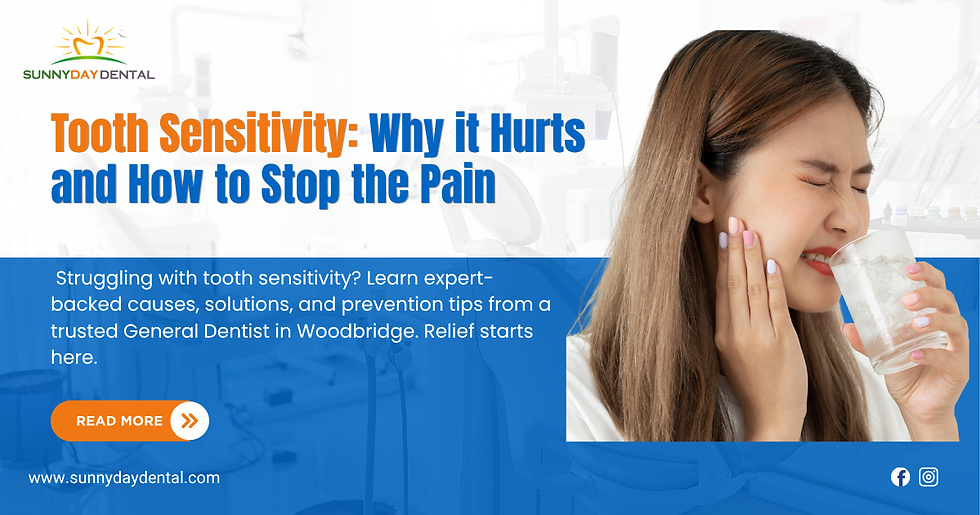Tooth Sensitivity: Why it Hurts and How to Stop the Pain
- Sunny Day Dental
- Jul 26
- 3 min read

If a sip of cold water or a spoonful of hot soup sends a sharp jolt through your teeth, you’re not imagining it. Tooth sensitivity is a common dental concern that affects millions of people in Canada and beyond. It happens when the inner layer of your tooth, known as dentin, becomes exposed—either due to enamel erosion or gum recession—allowing sensations like heat, cold, or sweetness to reach your tooth's nerve endings.
Research published in The Journal of Clinical Dentistry (2025) shows that more than 40% of adults aged 20–49 experience tooth sensitivity, especially in colder climates. The discomfort ranges from mild tingling to intense pain, and it can disrupt daily activities like eating, drinking, and even brushing.
What Are the Main Causes of Tooth Sensitivity?
Enamel Wear: Brushing too hard or using abrasive toothpaste can slowly strip your enamel, exposing the dentin underneath.
Gum Recession: If your gums recede due to gum disease or overbrushing, the softer root surfaces of your teeth become exposed.
Cracked or Worn Teeth: Even tiny fractures can expose the nerves inside your teeth.
Acidic Foods and Beverages: Citrus fruits, sodas, and vinegar-based foods contribute to enamel erosion, increasing tooth sensitivity.
Dental Procedures: Sometimes, recent fillings or cleanings can temporarily cause your tooth to become sensitive.
How to Stop Tooth Sensitivity: Actionable Tips That Work
If you’re wondering how to stop tooth sensitivity, the solution begins with identifying the root cause. Here’s what we recommend as dentists:
Switch to Desensitizing Toothpaste Look for products with potassium nitrate or stannous fluoride. These ingredients block pain signals and strengthen enamel.
Use a Soft Toothbrush Hard bristles may feel effective, but they often do more harm than good. Opt for a soft-bristled brush and gentle pressure
.
Avoid Highly Acidic Foods Limit your intake of soda, citrus, and wine. Rinse with water afterward if you consume these items.
Wear a Night Guard If you grind your teeth, especially at night, a custom mouthguard can protect your enamel and reduce tooth sensitivity over time.
Professional Fluoride Treatments A quick visit to a General Dentist in Woodbridge can get you a high-strength fluoride treatment that strengthens enamel and reduces discomfort.
Gum Treatment if Needed If receding gums are the cause, you may benefit from procedures like gum grafting or scaling and root planing, available at any reliable dental office in Woodbridge.
Tooth Sensitive to Cold? Here's Why That Happens
A tooth sensitive to cold usually means your dentin is exposed. When cold liquids or air hit the exposed nerve endings, your brain registers it as pain. This could be a sign of enamel erosion, gum recession, or even a small crack in your tooth. Fortunately, this type of tooth sensitivity is treatable and often reversible with early intervention.
Long-Term Prevention Tips
Visit Your Dentist Every 6 Months Preventive care helps spot issues early.
Floss Daily Gum health is crucial for preventing tooth sensitivity.
Limit Whitening Products Excessive use can irritate your enamel and nerves.
\
What Triggers Tooth Sensitivity?
Tooth sensitivity is triggered by exposed dentin due to enamel loss, gum recession, cracked teeth, aggressive brushing, or acidic diets. Cold or sweet foods often worsen it.
Looking for a Trusted Dental Office in Woodbridge?
At Sunny Day Dental, we understand how frustrating tooth sensitivity can be. Whether your tooth is sensitive to cold, sweets, or pressure, our experienced General Dentist in Woodbridge offers personalized care to treat and prevent sensitivity. We use the latest 2025-approved techniques, including fluoride varnishes, custom night guards, and gum therapy to help you live pain-free.
FAQs About Tooth Sensitivity
1. Can cavities cause tooth sensitivity even if there’s no visible hole?
Yes, early-stage cavities can irritate the dentin layer without creating noticeable holes. They can trigger sensitivity to cold or sweets. A dental checkup can confirm this.
2. Is tooth sensitivity always a sign of damage?
Not necessarily. Temporary sensitivity can happen after teeth whitening or cleanings. However, if it persists, it’s best to visit your dentist for evaluation.
3. Can children have tooth sensitivity too?
Yes, children can experience tooth sensitivity, especially if they have cavities, enamel hypoplasia, or brush too hard. A pediatric dentist can guide proper care.
4. Are electric toothbrushes safe for sensitive teeth?
They are, provided they have a pressure sensor and soft bristles. Some models even have a sensitivity mode specifically designed for gentle cleaning.
5. Will sensitivity get worse if left untreated?
Yes, untreated tooth sensitivity can progress into more severe issues like nerve exposure, infection, or tooth loss. Early diagnosis ensures better outcomes.




Comments